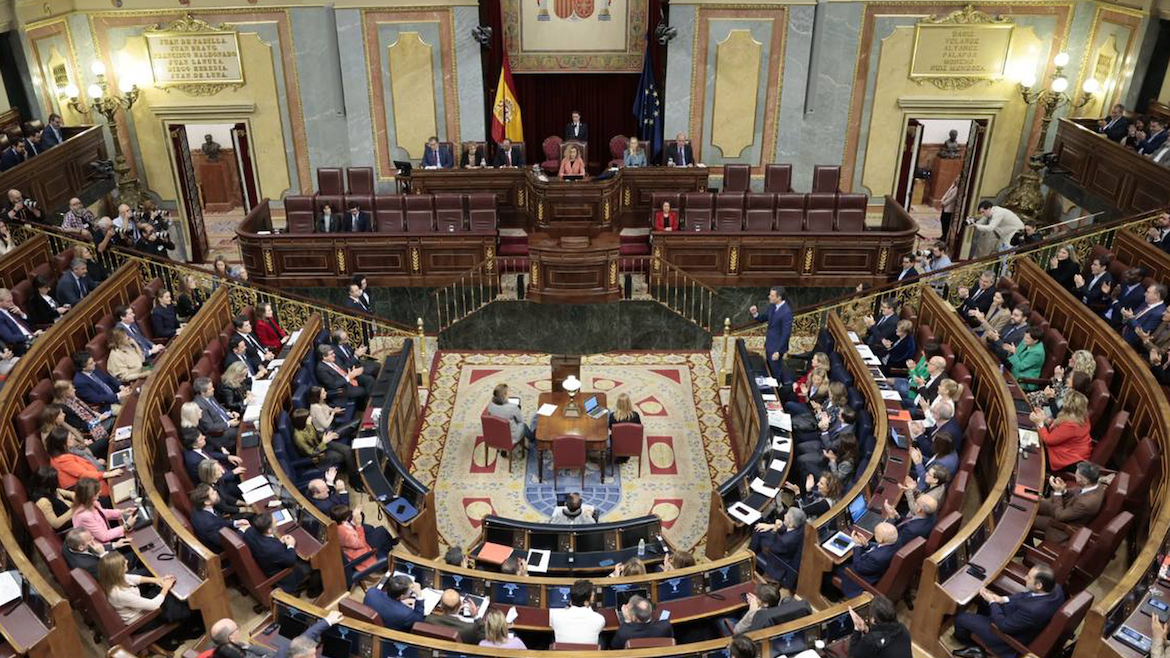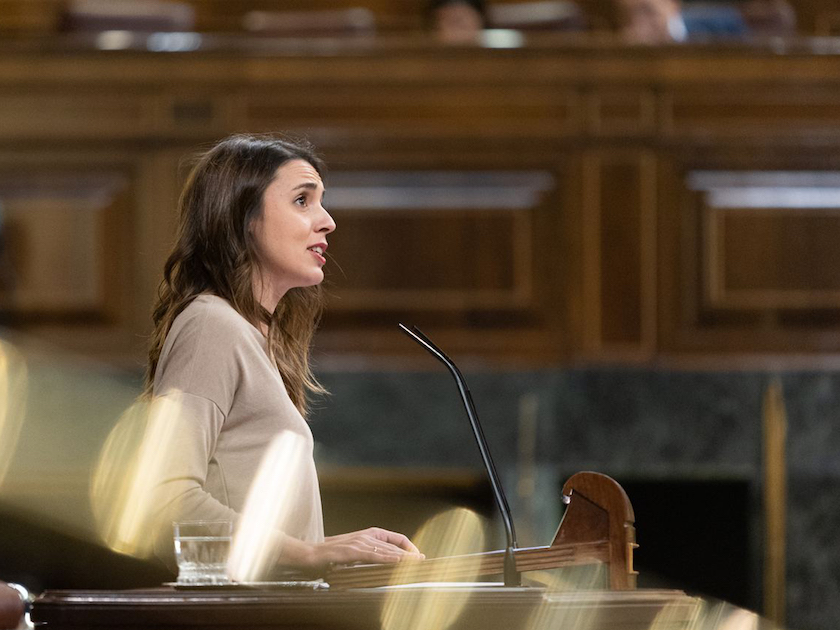Spain passes ‘trans law’: “People will be able to build their life happily and without guilt”
Medical experts, jurists, feminists, and faith groups oppose a law that allows teenagers aged 16 or more to change their legal gender without restrictions. Conversion therapies are to be punished with fines of up to 150,000 euros.
MADRID · 22 DECEMBER 2022 · 15:00 CET

On 22 December, after long debates, parliamentary strategies, media controversies and a strong opposition from medical authorities, the Spanish parliament passed on 22 December a law that will “depathologise” transgenderism.
What is known as the ‘trans law’ (officially “Law for the real and effective equality of trans people and for the guarantee of the rights of LGTBI people”) was passed with 188 votes in favour and 150 against just before Christmas, having completed an accelerated procedure in which most amendments were rejected and experts not allowed to present their views.
The most controversial point is that Spain will allow unrestricted gender self-determination of minors from the age of 16. Those aged 14 and 15 will be able to change sex against the will of their parents if they win a legal case with the support of a legal defender provided by the authorities. Children aged 12 and 13 will be able to change their sex in the register if a judge allows it.
The law bans so-called conversion therapies, even in the case when the person has asked for them, with fines of 10,000 to 150,000 euros to be applied to whoever practices them.
Así se ha hecho historia pic.twitter.com/tghDyrz6K3— Irene Montero (@IreneMontero) December 22, 2022
The law also allows ‘trans children’ aged between 12 and 16 to ask for medical treatments that modify their genitalia.
In schools, programmes promoting information about trans identities must be promoted at all levels, in collaboration with LGBTQI groups, and with the implication of teachers.
Businesses found guilty of discriminating against LGBTQI people could be closed by the authorities and media organisations who receive funds from the government could see discriminatory contents removed by the authorities.
A very controversial law
The text has been criticised not only by the conservative opposition parties, but also by judiciary organisations, who warned about the “legal uncertainty” the law creates for women.
Social groups usually linked to the left, including many feminist organisations, have also said they feel betrayed by the law. Medical and health authorities, specialists in sport and women’s law, university professors, and faith bodies have also raised a voice of alarm.
Evangelicals against
Among them was the Spanish Evangelical Alliance (AEE), which already criticised the plans for this law in 2020 because it would create “a kind of 'open bar' for sex changes and generate a cascade of social problems that directly affect women”. Such a law would “create a society with different levels of rights”.
“Allowing minors to decide to change their gender at such an early age would be a hasty decision and would contradict what would be their authentic and free final decision when they reach maturity”, the AEE said.
The evangelical body also rejected the undefined ban of so-called conversion therapies, defending the “right to freely receive the professional treatment and spiritual support they voluntarily require”.
Irene Montero: law about “happiness and freedom”
Irene Montero, the leftist Minister of Equality who defended the liberalisation of the abortion law just one week ago, told the Congress during the debate before the vote that the trans law “is about all people being able to build their lives freely, happily, without guilt”.

Irene Montero, Spanish Equality Minister, defending the trans law in the Spanish parliament, 21 December 2022. / Photo: Congreso Diputados.Trans people, the minister said, will now be able to “be who they are (…) you do not need guardians or witnesses, our obligation as a state is to recognise this. And I want to say it clearly: trans women are women”. She argued that these ideas, heavily disputed by experts and the experience of other countries, are “recognised by all international institutions”.
Knowing that only the Conservative opposition People’s Party (PP) and the hard right Vox would vote against the text, Montero attacked those who allegedly promote “transphobia and hatred” against LGBT people.
Leading figures of Prime Minister Pedro Sánchez’s Social Democratic Party (PSOE) had tried to stop the law, saying it endangered women and children but did not get the support of the head of the government. Leading feminist Carmen Calvo, even lost her post as Vice President of the government some months ago for opposing the law. In the final vote, she abstained.
The parties who voted yes to the trans law are the following: government partners PSOE and Podemos, with the support of Catalan independentists ERC, Basque nationalists PNV, leftists Más País, Catalan nationalists Junts, Galician nationalists BNG, Basque separatists EH Bildu, and other minor parties. Liberal Ciudadanos parliamentarians were given a free vote and mostly opposed the document.
Lack of debate
The only moment in which a voice was given to critics in the Congress of Deputies in Madrid came seven days before the law was passed. A non-official hearing was organised to explain the problems that the trans law and, more precisely, the whole queer philosophy is generating, mainly when dealing with the issue of sexual identity with children.
Participants in the forum organised in Madrid by the main opposition party, including doctors, endocrinologists, psychologists, psychiatrists, law and philosophy professors, bioethicists and gender specialists, presented the details of a law that, according to these experts, will generate problems in different areas of society instead of solving them. They said the law attempts to protect a monolithic discourse and avoid debate by developing a sanctioning apparatus at the behest of the executive branch.
The full text of the Law for the real and effective equality of trans people and for the guarantee of the rights of LGTBI people can be downloaded here (in Spanish).
Christians worried about the consequences
In an editorial article published by leading evangelical media Protestante Digital, the authors addressed the implications the law might have for evangelical churches, and called Christians to be "shrewd as snakes and as innocent as doves".
On social media, several Christians underlined the need to be "brave" in continuing to explain the Biblical views in a culture that increasingly defines them as hateful. Others mentioned the figure of Daniel in the Old Testament, who continued to worship God despite the legal pressures of the pagan context he lived in.
Published in: Evangelical Focus - europe - Spain passes ‘trans law’: “People will be able to build their life happily and without guilt”
Since you are here…
Evangelical Focus is a news and opinion platform that brings together Christians from across Europe and other parts of the world. We need the support of our readers to make this media project sustainable in the long term. You can support our work! Read about Evangelical Focus’s sustainability here.
Would you like to support the work of Evangelical Focus?
Use one of these methods. You can also transfer your donation to “Areópago Protestante / Evangelical Focus” IBAN: ES8521000853530200278394 (Swift / BIC: CAIXESBBXXX). Subject: “Donation Evangelical Focus”
